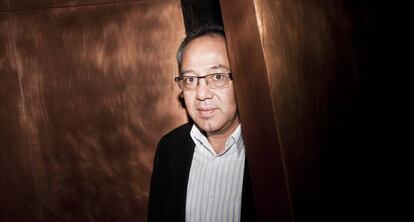Wanted in Ecuador: English-language teachers
3,000 staff sought in one of the Latin American countries where studies start earliest

Starting this year, English language will become a required course in primary schools throughout Ecuador. The Ministry of Education plans to give 100,000 six-year-olds who are entering primary school this year three hours of English class every week. The objective is that students will reach A-level proficiency in English and be able to communicate and understand basic topics by the time they turn 11 years old. The next challenge will be continuing English courses for students through junior (12-14 years old) and high schools (14-17 years old).
But the country does not have enough instructors to teach students the language of Shakespeare. Ecuador has 8,300 English-language teachers and needs 2,800 more for the beginning of this school year on the coast, which begins in May 2017. Education Minister Augusto Espinosa says the country will hire foreign English-language instructors to back up Go Teacher, a study abroad program for Ecuadorian teachers that began in 2012 and has already trained 1,000 educators. “We will leave the social tricks behind. For example, studying English with teachers who do not speak English,” Espinosa adds.
We will leave behind social tricks, such as studying English with teachers who do not speak English
Ecuador is, after Costa Rica and Colombia, the third country in Latin America where mandatory study of English begins at the earliest age, according to the Institute of Development and Education Research (IFIE). Espinosa, who has been in charge of the ministry for three years, says the new initiative is one of the accomplishments of the administration of President Rafael Correa. The government has provided primary education to 96% of children and 62 schools with capacity ranging from 570 to 1,140 students. Each unit costs between $4-6 million to build. “We understand that providing equal opportunities in terms of access to education is the best way to overcome poverty.”
Ecuador wants to extend access to education at all levels. Only 44% of toddlers attend pre-school and just 69% of adolescents are high school students. And what are the statistics on graduations? Espinosa evades the question: “I don’t have that number memorized but the best reference is the number of years of study. We are reaching 11 years of schooling.” But according to the last report published by the National Statistics and Census Institute in 2010, on average, Ecuadorians study for nine years.
Investment in education remains far below the administration’s objective of 6% of gross domestic product (GDP). Ecuador has invested 3.7% on average every year over the last decade or $21 billion. Most of that investment was used to raise teachers’ pay, Espinosa says. Salaries for first-year instructors grew from $160 to 817.
Investment in education remains far below the administration’s objective of 6% of GDP
The Education Ministry also wants to improve teacher’s credentials, Espinosa says. Periodic evaluations and the creation of the teachers’ college, Universidad Nacional de Educación, which will graduate its first class in 2017, are significant steps toward that goal. Those changes, however, led to tensions between Espinosa and the old teachers’ union, Unión Nacional de Educadores (UNE). “UNE has always been mediocre and opposes everything,” the minister says. Espinosa explains that the now defunct organization was not conceived as a union but as a civic group and that it never delivered the list of members who voted for its last board of directors as regulations require: “They only had to show that elections did take place and they refused for the last two years and in this democracy there are no privileges for anyone.”
Espinosa also refutes the organization’s claims that 40,000 teachers were allegedly dismissed. “Between 2011 and 2015, the number of instructors increased by 3,000. We’ve had merit-based application processes and public entrance exams to eliminate contracts and a small percentage decided to opt out. Those would be, in quotation marks, the dismissals.”
English version by Dyane Jean François.
Tu suscripción se está usando en otro dispositivo
¿Quieres añadir otro usuario a tu suscripción?
Si continúas leyendo en este dispositivo, no se podrá leer en el otro.
FlechaTu suscripción se está usando en otro dispositivo y solo puedes acceder a EL PAÍS desde un dispositivo a la vez.
Si quieres compartir tu cuenta, cambia tu suscripción a la modalidad Premium, así podrás añadir otro usuario. Cada uno accederá con su propia cuenta de email, lo que os permitirá personalizar vuestra experiencia en EL PAÍS.
¿Tienes una suscripción de empresa? Accede aquí para contratar más cuentas.
En el caso de no saber quién está usando tu cuenta, te recomendamos cambiar tu contraseña aquí.
Si decides continuar compartiendo tu cuenta, este mensaje se mostrará en tu dispositivo y en el de la otra persona que está usando tu cuenta de forma indefinida, afectando a tu experiencia de lectura. Puedes consultar aquí los términos y condiciones de la suscripción digital.








































